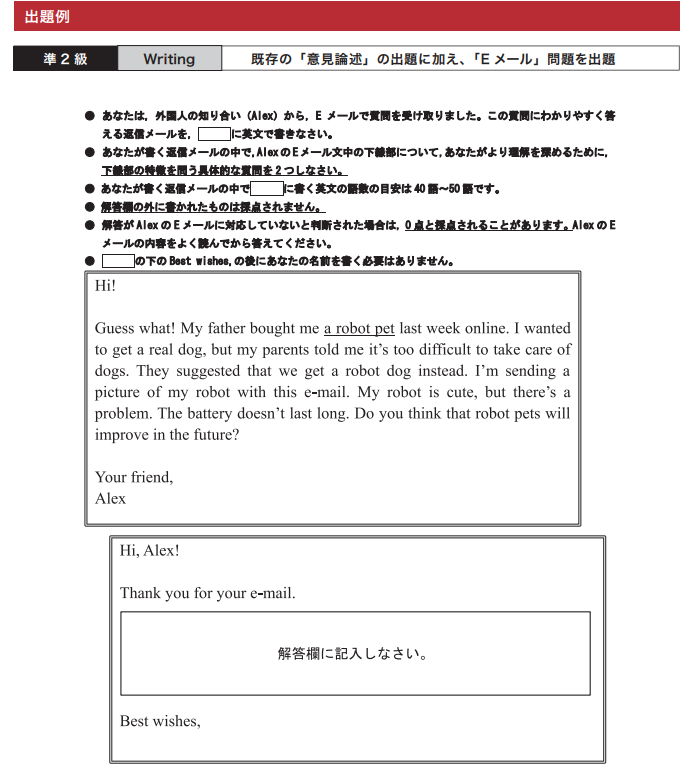● You have received an email question from a foreign acquaintance, Alex. Write a reply in English in the ‘Answer Box’, clearly answering this question.
● In your reply email, regarding the underlined parts in Alex’s email, ask two specific questions to deepen your understanding of the underlined features.
● The English text you write in the ‘Answer Box’ Suggested length : 40 to 50 words.
● Any text written outside the ‘Answer Box’ will not be graded.
● If your answer is deemed not to correspond to Alex’s email, it may be scored as zero points. Please read the content of Alex’s email carefully before answering.
● You do not need to write your name after ‘Best wishes,’ at the bottom of the ‘Answer Box’.”
Evaluation Criteria
■ The answer will be scored based on three aspects: content, vocabulary, and grammar.
■ Each aspect is evaluated on a scale of 0 to 4 points, making the total maximum score 12 points.
Points for Email Tasks
- Read the instructions carefully and adhere strictly to them.
- Complete tasks such as ‘answering two questions’.
- Respond to the questions in the sender’s email.
Lesson 1.
Hi!
I’m working on a school project about traditional celebrations around the world. Next week, I have to present about “New Year’s Eve celebrations” in different cultures. I remember you mentioning how special it is in your country. Could you tell me more about how you celebrate it? Are there any unique traditions or foods involved? I’m really excited to learn and share this information!
Your friend,
Alex

Model Answer (43 words):
For New Year’s Eve, we have family gatherings and watch fireworks. A unique tradition is eating [special food], symbolizing good luck. How does your country celebrate it? Are there any special foods or traditions associated with New Year’s Eve where you live?
====================================================
Lesson 2
Hi!
For my world cultures class, we’re discussing “traditional family gatherings” around the globe. I remember you mentioned that family plays a big role in your culture. Could you share more about a typical family gathering in your country? What activities do you do, and are there any special dishes that are always prepared? I’m eager to learn and compare it with our traditions!
Best regard

Model Answer (50 words):
Typical family gatherings here involve [activity], especially during [occasion]. We always prepare [special dish], which has a cultural significance. What kind of activities are common in your family gatherings? Do you have any special dishes that are a must-have at your family events?
=============================================================
Lesson 3
Hi!
I’ve been exploring various global music genres and I’m intrigued by traditional Japanese music. I’ve heard a little about the “koto and shamisen.” Could you explain more about these instruments and the type of music they’re used in?
Your friend,
Alex

Model Answer
Traditional Japanese music is rich and varied. Are you interested in the history of these instruments or their contemporary use? Also, would you like to know about the genres they are commonly used in? The koto and shamisen are key in classical and folk music.
=================================================================
Lesson 4.
Hi!
I’m working on a project about global food culture. I’m curious about “Japanese street food.” What are some popular street foods in Japan, and how do they reflect the local culture and lifestyle?
Your friend,
Alex

Model Answer
Japanese street food is a delightful aspect of the culture. Are you interested in traditional street foods or modern variations? Also, which regions are you focusing on? Foods like takoyaki, yakitori, and okonomiyaki are not just tasty but also reflect the fast-paced lifestyle.
================================================
Lesson 5
Hi!
I’m working on a tourism project and focusing on inbound travel to Japan. I’m curious about the “attractions and experiences” that draw international visitors to Japan’s ancient capitals like Kyoto and Nara. What makes them so appealing to tourists?
Your friend,
Alex

Model Answer
Japan’s ancient capitals are rich in history and culture. Are you interested in their historical sites or cultural activities? Also, what aspects of these cities do you think appeal most to international tourists? Their temples, traditional streets, and cultural events are major attractions.
======================================================
Lesson 6.
Hi!
I recently tried conveyor belt sushi for the first time and loved it! I’m interested in “the history and popularity” of this dining style in Japan. How did it start, and why do you think it became so popular, both in Japan and globally?
Your friend,
Alex

Model Answer:
Conveyor belt sushi is a fascinating part of Japanese cuisine. Are you curious about its origins or how it evolved over time? Also, are you interested in the variety of sushi offered? Its affordability and the fun dining experience have contributed to its global popularity.
=======================================================
Lesson 7.
Hi!
I’m planning a winter trip to Japan and I’m really excited about visiting hot springs. Can you tell me about the “cultural significance and etiquette” of hot springs in Japan? I want to make sure I respect the traditions.
Your friend,
Alex

Model Answer
Japanese hot springs, or onsen, are an integral part of the culture. Are you wondering about public bath etiquette or the types of hot springs? Also, which regions are you planning to visit? Remember, cleanliness and quiet enjoyment are key aspects of onsen etiquette.
========================================================
Lesson 8.
Hi!
I’ve noticed that SNS platforms are used differently in Japan compared to my country. I’m curious about the “role and impact” of SNS in Japanese society. How do people in Japan typically use these platforms, and what’s their influence on daily life?
Your friend,
Alex

Model Answer
Social media usage in Japan is quite unique. Are you interested in the most popular platforms or the content shared? Also, are you looking into personal use or business marketing? Japanese users often focus on privacy and aesthetic content, influencing social trends and communication.
=======================================================
Lesson 9
Hi!
I’m fascinated by the firework displays I’ve seen in Japanese dramas. I heard summer fireworks are a big thing in Japan. Can you tell me more about the “tradition and significance” of fireworks in Japanese culture? What do they symbolize?
Your friend,
Alex

Model Answer
Fireworks, or hanabi, are a significant part of Japanese summer. Are you curious about their historical significance or how they are celebrated today? Also, are you interested in the types of fireworks displays? They symbolize ephemeral beauty and are a highlight of summer festivals.
==========================================================
Lesson 10
Hi!
I’m amazed at how smartphones have changed daily life globally. I’m interested in “the impact of smartphones on Japanese society.” How have smartphones, or ‘smaho’, influenced lifestyle, work, and communication in Japan?
Your friend,
Alex

Model Answer:
Smartphones, or ‘smaho’, have greatly influenced Japanese life. Are you interested in their impact on personal life or business? Also, what specific changes are you curious about? They’ve transformed communication, shopping, and entertainment, making life more convenient but also more digitally reliant.
===================================================
Lesson 11
Hi!
I’m a big fan of smartphone games and I know Japan has a huge market for them. Can you tell me about the “popularity and trends” of smaho games in Japan? What makes them so appealing, and which are the most popular?
Your friend,
Alex

Model Answer:
Japanese smartphone games are known for their creativity and variety. Are you interested in RPGs or casual games? Also, what elements do you think make them appealing? Their engaging storytelling, graphics, and social aspects make them popular among a wide range of audiences.
===================================================
Lesson 12.
Hi!
Autumn in Japan seems beautiful, especially with the autumn leaves. I’m planning a trip to experience this. Can you suggest the “best places and times” to see the autumn leaves? I want to capture the most scenic views.
Your friend,
Alex

Model Answer:
Viewing autumn leaves in Japan is a wonderful experience. Are you looking for spots in the mountains or in cities? Also, which part of Japan are you planning to visit? Kyoto and Hokkaido are famous for their autumn scenery, best viewed from mid-October to late November.
====================================================
Lesson 13
Hi!
I’m doing a project on global responses to intense heat and climate change. I’ve heard Japan experiences intense heat in summer. Can you tell me about “measures and adaptations” in Japan to cope with high temperatures? How do people stay cool?
Your friend,
Alex

Model Answer:
Adapting to intense heat in Japan involves a mix of traditional and modern methods. Are you interested in public health measures or individual practices? Also, are you focusing on urban or rural areas? Use of cooling technology, lightweight clothing, and public heat advisories are common.
======================================================
Lesson 14.
Hi!
I’m a huge baseball fan and I’ve heard that it’s very popular in Japan too. I’m especially interested in Shohei Ohtani’s career. Can you tell me about the “popularity of baseball” in Japan and how players like Ohtani have influenced the sport?
Your friend,
Alex

Model Answer:
Baseball is indeed one of Japan’s most beloved sports. Are you curious about its history in Japan or its current status? Also, what aspects of Ohtani’s career interest you? His success in MLB has increased baseball’s popularity and inspired many young athletes in Japan.
=======================================================
Lesson 15
Hi!
I’m part of a school club that’s creating a guide on “leisure activities worldwide.” Could you tell me about popular leisure activities in your country? What do people typically do in their free time? Are there any activities that are unique to your culture or region? Understanding how people relax and enjoy themselves in different parts of the world is fascinating to me. I’m excited to learn more about your country’s leisure culture.
Best,
Alex

Model Answer (58 words):
Popular leisure activities here include [Activities]. They’re unique because of [Reason]. They reflect our [Cultural Aspect]. How do people in your region typically spend their leisure time? Are there any activities unique to your culture?
===============================================
Lesson 16.
Hi!
In my world cultures class, we’re exploring “traditional family roles.” Could you share how family roles are typically viewed in your country? Are there specific responsibilities or expectations for different family members? Also, have these roles changed over time, or do they remain deeply rooted in tradition? I’m curious about the similarities and differences in family dynamics globally. Your perspective would be really helpful for my class project.
Best regards,
Alex

Model Answer (58 words):
Family roles here traditionally involve [Roles/Responsibilities]. They have [Changed/Remained the same] over time. They’re influenced by [Cultural/Social factors]. How are family roles viewed in your culture? Have they evolved over time?
===================================================
Lesson 17.
Hi!
For my environmental studies course, we’re researching “urban green spaces” around the world. I’d like to know about the parks or public gardens in your city. How do these spaces impact urban life? Are they widely used by residents? Additionally, are there any unique features or conservation efforts associated with these green spaces? Learning about different approaches to urban nature is crucial for our study on sustainable city living.
Many thanks,
Alex

Model Answer (55 words):
Our city’s green spaces like [Parks/Gardens] impact urban life by [Impact]. They are [Widely/Not widely] used. Unique features include [Features]. What role do urban green spaces play in your city? Are there any notable conservation efforts?
=================================================
Lesson 18.
Hi!
I’m working on a sociology project about “community events and festivals.” What are some significant community events or festivals in your country? How do they bring people together, and what activities are involved? Also, do these events have historical or cultural significance? Understanding how communities celebrate and bond is essential to my project. I’d really appreciate it if you could share some details about the festivals and events that are important in your society.
Kind regards,
Alex

Model Answer (60 words):
Significant events include [Events/Festivals], which unite people through [Activities]. They hold [Historical/Cultural significance]. These events reflect our [Cultural Values/Traditions]. How does your community celebrate together? Are there any events with deep cultural or historical roots in your society?
===================================================
Lesson 19.
I’m excited about the upcoming school festival. Our class decided to have a “Japanese tea ceremony” booth. It’s a big part of our culture, but I’m not sure about the correct steps. Can you tell me more about how to prepare and present the tea properly?
Your friend,
Alex

Model Answer :
It’s great that you’re participating in a tea ceremony. Are there specific parts of the ceremony you’re unsure about? Also, do you need to know about the attire or just the procedure? Tea ceremonies are all about precision and respect for tradition.
================================================
Lesson 20.
Hi!
In my global health class, we’re discussing “dietary habits and health.” What are common dietary habits in your country? How do these habits relate to overall health and wellness? Are there any specific foods or eating patterns that are particularly emphasized? It’s fascinating to see the connection between diet and health in different cultures. Any information you share will be valuable for my class discussion.
Best,
Alex

Model Answer (53 words):
Common dietary habits here include [Habits], emphasizing [Foods/Patterns]. They relate to health by [Relation]. What dietary habits are common in your area? How do they impact health and wellness?
==================================================
Lesson 21.
Hi!
I’ve been watching a lot of historical movies lately. They made me curious about samurai culture. What’s the most fascinating aspect of “samurai history” for you? I’d love to learn more from a local perspective.
Your friend,
Alex

Model Answer:
Samurai history is indeed captivating! Are you interested in their lifestyle or the warfare techniques? Also, which period of samurai history intrigues you the most? Personally, I find their code of honor and discipline truly fascinating.
=====================================================
Lesson 22.
Hi!
I’m creating a presentation about “unique celebrations” around the world. I remember you mentioning a special festival in your country. Could you describe what makes this festival unique? What activities are involved, and is there special food or music? Also, how do people in your community prepare for it? I’m excited to include this in my presentation to highlight cultural diversity.
Best,
Alex

Model Answer (52 words):
Our unique festival, [Festival Name], involves [activities] and special [food/music]. Preparation includes [preparation activities]. How do your community’s celebrations compare? Are there specific foods or music associated with your local festivals?
===================================================
Lesson 23.
Hi!
I’m part of a project studying “traditional games” from different countries. Could you tell me about a popular traditional game in your country? How is it played and what are the rules? Also, does this game have any cultural or historical significance? I find it fascinating how games reflect cultural values. Any details you provide will be valuable for understanding the cultural context of these games.
Thanks,
Alex

Model Answer (54 words):
A popular game here is [Game Name], played by [rules/how to play]. It’s culturally significant because [reason]. What traditional games are played in your area? Do they hold any cultural or historical significance?
==================================================
lesson 24.
Hi!
For my art class, we’re exploring “street art in different cultures.” I’m curious about the street art scene in your city. What themes do artists typically explore, and are there any famous murals or artists? Also, how is street art perceived in your community? Is it seen as a form of expression or merely graffiti? Understanding different perspectives on street art will add depth to my project.
Kind regards,
Alex

Model Answer (58 words):
Street art here explores themes like [themes] and includes famous works by [artist/mural]. It’s perceived as [expression/graffiti]. What’s the street art scene like in your area? How is it generally viewed by the community?
==================================================
lesson 25.
Hi!
For my science project, I’m focusing on renewable energy sources. I heard Japan is doing a lot in this field. Can you share some insights on “Japan’s approach to renewable energy”? I think it could really help my project.
Your friend,
Alex

Model Answer :
Japan’s renewable energy efforts are quite innovative. Are you interested in solar or wind energy? Also, how in-depth do you need the information? Japan is making strides in solar power and off-shore wind farms, which might be interesting for your project.
================================================
Lesson 26.
Hi!
I’m planning to visit Japan next summer. I want to explore both the urban and rural areas. Do you have any recommendations for “must-visit places” in Japan that are not too touristy? I’d like to experience the authentic Japanese lifestyle.
Your friend,
Alex

Model Answer
It’s exciting that you’re visiting Japan! Are you interested in historical sites or nature spots? Also, what kind of experiences are you looking for – cultural, culinary, or adventure? For an authentic experience, I recommend visiting the countryside and small towns.
=================================================
Lesson 27
Hi!
I’ve been trying to learn Japanese by watching anime. It’s fun, but I’m not sure if it’s effective. What do you think about “learning a language through media”? Do you have any tips for making it more effective?
Your friend,
Alex

Model Answer
Learning through media can be effective! Are you watching with subtitles or without? Also, do you practice speaking the phrases you learn? Combining media with language exercises and interaction with native speakers can enhance your learning.
==================================================
Lesson 28
Hi!
I’m doing a project on global fashion trends and how they influence local styles. Japan seems to have a unique fashion scene. Can you tell me more about “Japan’s current fashion trends”? I’m curious about the youth culture.
Your friend,
Alex

Model Answer
Japanese fashion trends are quite diverse! Are you focusing on street fashion or traditional attire? Also, are you interested in how these trends reflect youth culture? Currently, there’s a mix of modern and traditional influences, especially in urban areas.
================================================
Lesson 29
Hi!
I just read about Japan’s advanced technology in robotics and AI. It’s fascinating! Can you tell me how this technology is “integrated into everyday life” in Japan? I’m curious about its impact on daily activities.
Your friend,
Alex

Model Answer
Robotics and AI are indeed integral to Japanese technology. Are you curious about their use in industries or in personal life? Also, which aspect of AI integration interests you the most? Robotics is often used in manufacturing, while AI assists in services and home automation.
=================================================
Lesson 30
Hi!
Our school’s sports club is interested in learning about traditional Japanese sports. We know about sumo, but are there any other “traditional sports” we should explore? I think it would be great for our cultural exchange program.
Your friend,
Alex

Model Answer
Japanese traditional sports offer a rich cultural experience. Are you looking for martial arts or non-combative sports? Also, what age group are you targeting for this exchange program? Besides sumo, sports like kendo, judo, and kyudo are significant in Japanese culture.
===================================================
Lesson 31
Hi!
In my world literature class, we’re discussing Japanese poetry. I find the structure of “haiku and tanka” poems fascinating. Could you explain the key differences between these two forms and their role in Japanese literature?
Your friend,
Alex

Model Answer
Japanese poetry is known for its depth and brevity. Are you interested in the thematic differences or the structural aspects of haiku and tanka? Also, are you looking into historical or modern examples? Haiku focuses on nature and simplicity, while tanka often explores emotions.
=================================================
Lesson 32
Hi!
I’m working on a cultural exchange program and researching “holiday traditions.” Can you share how you celebrate a major holiday in your country? What are the typical customs, foods, and activities? Also, has the way this holiday is celebrated changed in recent years? I’m eager to learn about the blend of tradition and modernity in holiday celebrations.
Kind regards,

Model Answer (57 words):
We celebrate [Holiday] with [customs], [foods], and [activities]. It has [changed/remained the same] recently, blending [tradition/modernity]. How do you celebrate major holidays in your region? Have the traditions evolved?
================================================
Lesson 33
Hi!
In my music appreciation class, we’re studying “instruments unique to different cultures.” I’m interested in learning about a musical instrument that’s special to your country. Can you describe its appearance, how it’s played, and the type of music it’s used for? Also, is it still commonly used today, or is it more of a historical instrument?
Thanks a lot,
Alex

Model Answer (54 words):
Our unique instrument is the [Instrument]. It looks [description] and is played by [method]. Used in [music type], it’s [still commonly used/more historical]. What unique instruments are there in your culture? Are they still in use today?
==========================================================
Lesson 34
Hi!
For my world literature class, we’re exploring “famous authors and their impact.” Could you tell me about a renowned author from your country? What are their most notable works, and why are they significant? Also, how have their writings influenced your country’s literature and culture? I’m fascinated by how authors can shape cultural and literary landscapes.
Best wishes,
Alex

Model Answer (57 words):
A renowned author here is [Author], known for [works]. They’re significant due to [reasons] and have influenced [literature/culture] by [impact]. What authors have significantly impacted your country’s literature? How have they influenced culture?
=====================================================
Lesson 35
Hi!
For my art class, I’m doing a project on contemporary Japanese artists. I’m particularly interested in those who blend traditional and modern styles. Could you tell me about some “influential contemporary artists” in Japan and their works?
Your friend,
Alex

Model Answer
Contemporary Japanese art is a blend of tradition and innovation. Are you looking for artists in specific mediums, like painting or sculpture? Also, are you interested in their influence within Japan or internationally? Artists like Yayoi Kusama and Takashi Murakami are great examples.
=========================================================
Lesson 36
Hi!
In my social studies class, we’re discussing “community service and volunteerism.” What types of community service initiatives are common in your country? How do people get involved, and what impact do these initiatives have? Also, is volunteerism widely encouraged or practiced? Learning about community engagement in different cultures is crucial for our understanding of global social responsibility.
Best,
Alex

Model Answer (53 words):
Common community service initiatives include [initiatives], with people getting involved through [methods]. They impact [aspect]. Is volunteerism encouraged in your area? What types of community service are common?
===================================================
Lesson 37
Hi!
In my world religions class, we’re learning about “religious festivals and their significance.” Could you describe a major religious festival in your country? What are the customs and rituals involved, and what is its spiritual significance? Also, how does this festival bring together the community? I’m interested in how religious observances foster community and cultural identity.
Sincerely,
Alex

Model Answer (54 words):
A major religious festival is [Festival], involving [customs/rituals]. Its spiritual significance lies in [significance]. It brings the community together by [method]. How do religious festivals in your culture foster community? What’s their cultural significance?
==============================================
Lesson 38
Hi!
I’m working on a project about technological advancements in healthcare. I’ve read that Japan is leading in this area. Can you tell me about some “innovative technologies or practices” in Japanese healthcare? I’m particularly interested in how they improve patient care.
Your friend,
Alex

Model Answer
Japanese healthcare indeed incorporates cutting-edge technology. Are you interested in medical devices or digital health solutions? Also, which aspect of patient care are you focusing on – diagnosis, treatment, or rehabilitation? Robotics and AI have significantly enhanced patient care efficiency.
==================================================
Lesson 39
Hi!
I’m curious about Japan’s approach to space exploration. I know Japan has made significant contributions, but I’d like to know more about “recent projects or advancements” in Japanese space research. Can you share some details?
Your friend,
Alex

Model Answer
Japan’s space exploration efforts are quite advanced. Are you interested in manned missions or satellite technology? Also, are you looking at international collaborations or independent projects? Recent advancements include satellite launches for Earth observation and participation in international space missions.
====================================================
Lesson 40
Hi!
I’m planning a school project on global animation industries. Japanese anime seems to have a huge global influence. Can you discuss “the evolution and impact” of anime in Japan and worldwide? I’m interested in its cultural significance.
Your friend,
Alex

Model Answer
Anime has evolved significantly both in Japan and globally. Are you focusing on its artistic development or its cultural impact? Also, which eras of anime are you most interested in? Anime’s journey from local entertainment to global phenomenon reflects its vast cultural appeal.
============================================-=====









